You should keep a check on your vehicle’s internal parts from time to time and try to clean the dust and the debris that is settled on the parts. Sometimes, spraying water to internal parts can turn out to be bad as there are a lot of electrical systems that can be damaged because of the sudden exposure to water. However, you can use water in small amounts, to clean the dirt over the engine’s surface.
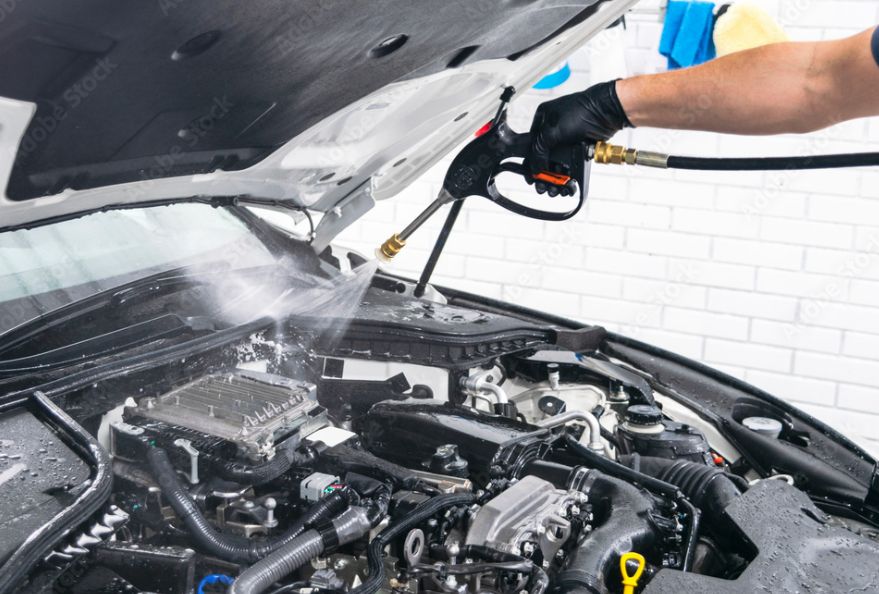
Table of Contents
Can you spray your engine with water?
Spraying water over the engine seems simple, but it is not that straightforward; it should be noted that while spraying water on your car’s engine, you should avoid using cold water. Cold water when sprayed on a heated engine will cool things too fast causing stress on the metal and hence leading to cracks in the engine.
Water can also get into the alternator or inside the engine, damaging the engine sensors, which can cost you a considerable amount of money. Use warm or mildly hot water or spray water when the engine is not hot to clean the dust, dirt, and rust from the surface of your engine.
Maintenance of a vehicle is the sole factor that affects the efficiency of any vehicle; you should try to clean your car regularly to avoid the dust from settling down between the parts, which could result in overheating and can lead to internal damage to your car.
Is it OK to hose down your car engine?
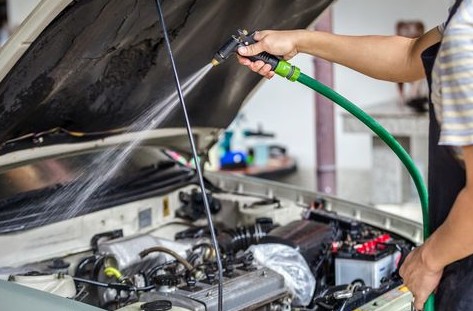
You can use mild hot or warm water to clean your car’s engine by removing dirt and debris from the engine’s surface. But it is not advisable to spray water from very close to the engine surface. You should be at least 5 inches away to do so. If the water pressure is too high, it can damage the engine surface.
Also, don’t use too much water pressure to avoid splashes over other internal parts under the hood. Most electrical wiring and systems can get damaged from excessive exposure to water.
Can you spray under your car hood with water?
If we want to clean our car by removing all the layers of excess dirt and dust, then most of us would think of simply using a water spray to get it done. This method can be used to clean the dust, but some things should be kept in mind before spraying water under the hood.
- Use warm or mildly hot water to clean the engine, as cold water, when sprayed on a heated engine, can let the cracks build up over the surface of the engine.
- Don’t use a lot of water pressure while spraying the water over the engine, as this can cause damage to the engine sensors and alternators.
- Cover all the other sensitive parts that have a high chance of getting damaged due to water exposure.
Is it OK to wash cars at night?
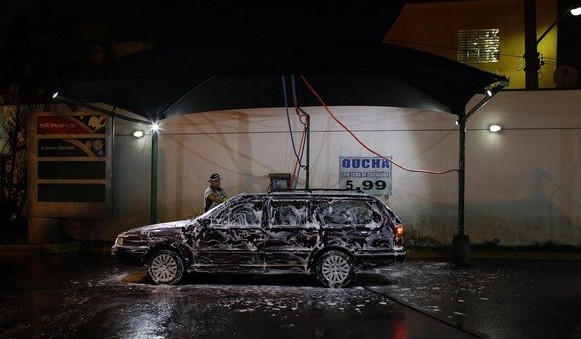
Washing a car at night might sound more comfortable than washing a car on a hot summer day, but there are some factors that you should consider.
- You must get enough lighting to wash your car and operate it as it is nighttime. You can spray water over any sensitive part, which could turn out to be a damaging part.
- At night it would take a long time for your car to dry up; if water is resting over the car’s metal surfaces, it can cause corrosion over the surface.
Should you let your car air dry?
After you have washed up your car, you would be thinking of keeping it under direct sunlight for it to dry up quickly, but keeping your water-drenched car in broad daylight can dry it up very quickly and can cause marks on the surface of the car. However, it does not mean you should not dry up your car. Here are some of the points we have articulated that are worth pondering.
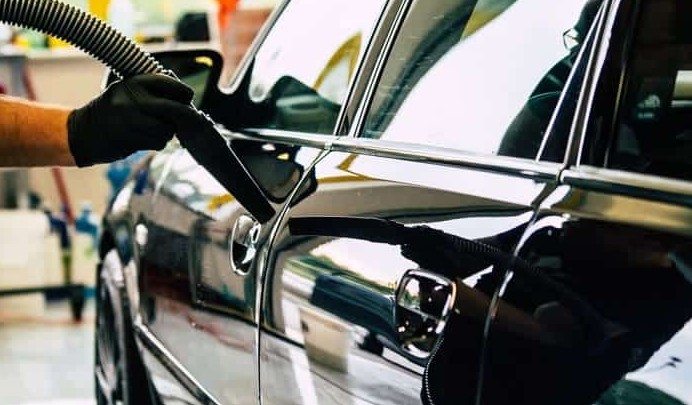
- Use a clean towel to wipe out all the excess water from the surface of your car.
- Try to wipe from top to bottom. To avoid different kinds of marks that come along.
- Try to keep your car out of direct sunlight.
How to Wash Car Engine?
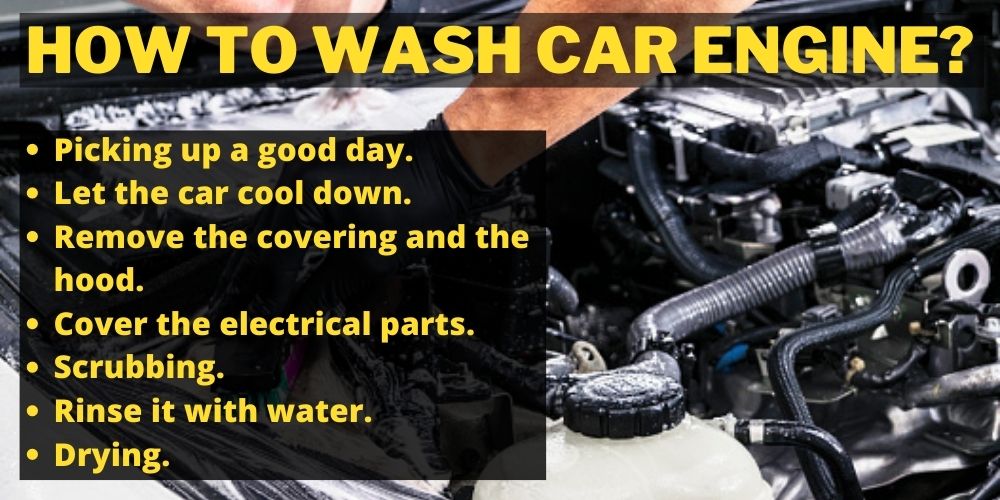
🚗 Step 1- Picking up a good day
This is one of the most underrated and misunderstood factors when deciding the day for a car wash; most people think that it is good to wash their vehicle on a hot and warm day as it will dry soon but here’s the catch if you let your car dry up in broad day sunlight then it will cause water stains.
Ideally, you should wash your car on a normal windy day.
🚗 Step 2- Let the car cool down
Do not wash your car immediately after driving, let it cool down for some time. Dealing with a heated-up engine can get your skin burns. Also, if you spray water on a heated engine surface, then it will form cracks on the surface.
🚗 Step 3- Remove the covering and the hood
Start by popping up the hood of your car; now remove any covering to access the engine. Detach the battery’s terminals to avoid any casualties that might be prone. If you are uncomfortable working with the battery, you can remove the battery and then continue working.
🚗 Step 4- Cover the electrical parts
Now you would have a clear view of the car’s engine and the related electrical components; we cannot spray water yet as these electrical components could get damaged due to exposure to water, so we need to secure them by covering them using the plastic bags and sheets.
🚗 Step 5- Scrubbing
If there is not much dirt and grease on your engine surface, then there is no need to scrub it. You can just wipe it with a clean cloth, but if you have a greasy and very dirty engine, you should scrub the engine properly with a small brush.
🚗 Step 6- Rinse it with water
After you have scrubbed the engine surface now with mild hot water, rinse the surface of the engine by spraying water and wiping all the dirt and grease off the surface of the engine.
🚗 Step 7- Drying
After rinsing it properly, wipe the excess water off the engine surface using an old rag or a clean cloth. It should be kept in mind not to leave any water over the surface of the engine for a long time as it can cause stains and other problems.
You May Also Find Useful: Best Catalytic Converter Cleaner
Conclusion
It is never a bad thing to take care of your vehicle; try washing up your car regularly as a maintenance service. Follow all the rules and safety standards when washing up your car’s engine, which involves dealing with the electrical components as well.
